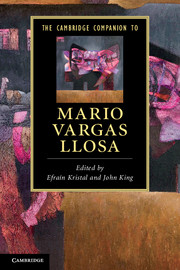Book contents
- Frontmatter
- Introduction
- 1 Reality and rebellion: An overview of Mario Vargas Llosa’s literary themes
- 2 The early novels: The Time of the Hero and The Green House
- 3 The total novel and the novella: Conversation in The Cathedral and The Cubs
- 4 Humour and irony: Captain Pantoja and the Special Service and Aunt Julia and the Scriptwriter
- 5 The historical novel: The War of the End of the World
- 6 Innocence and corruption: Who Killed Palomino Molero? and The Storyteller
- 7 The political novels: The Real Life of Alejandro Mayta and Death in the Andes
- 8 The erotic novels: In Praise of the Stepmother and The Notebooks of Don Rigoberto
- 9 The dictator novel: The Feast of the Goat
- 10 From utopia to reconciliation: The Way to Paradise, The Bad Girl and The Dream of the Celt
- 11 The essays
- 12 The memoir: A Fish in the Water
- 13 The plays
- 14 Film and the novels
- 15 An interview
- Further reading
- General index
- Index of selected fictional characters
- Index of selected works by Vargas Llosa
11 - The essays
Published online by Cambridge University Press: 28 January 2012
- Frontmatter
- Introduction
- 1 Reality and rebellion: An overview of Mario Vargas Llosa’s literary themes
- 2 The early novels: The Time of the Hero and The Green House
- 3 The total novel and the novella: Conversation in The Cathedral and The Cubs
- 4 Humour and irony: Captain Pantoja and the Special Service and Aunt Julia and the Scriptwriter
- 5 The historical novel: The War of the End of the World
- 6 Innocence and corruption: Who Killed Palomino Molero? and The Storyteller
- 7 The political novels: The Real Life of Alejandro Mayta and Death in the Andes
- 8 The erotic novels: In Praise of the Stepmother and The Notebooks of Don Rigoberto
- 9 The dictator novel: The Feast of the Goat
- 10 From utopia to reconciliation: The Way to Paradise, The Bad Girl and The Dream of the Celt
- 11 The essays
- 12 The memoir: A Fish in the Water
- 13 The plays
- 14 Film and the novels
- 15 An interview
- Further reading
- General index
- Index of selected fictional characters
- Index of selected works by Vargas Llosa
Summary
When you set out for Ithaka
Ask that your way be long,
Full of adventure, full of instruction.
C. P. Cavafy, ‘Ithaka’Mario Vargas Llosa is the most widely discussed – and debated – public intellectual in the Spanish-speaking world; his commentaries are read across the globe. To many he has become – in a phrase that he used with intentional irony to describe his long-term ideological sparring partner, Günter Grass – ‘the ‘conscience’ of an era, for he is a writer ‘who has opinions on and debates everything’. He has been commenting on politics since the early 1960s, though his conviction that a writer of fiction can play a decisive role in the political arena waned considerably after his own failed candidacy for the Peruvian presidency in 1990. His publications, on politics and on broader cultural issues, are more extensive than his works of fiction, and are so inextricably linked to his intellectual biography that they are best understood in the context of developments and changes in his views about politics, the arts and culture. Indeed, his collections of essays often include open letters and documents that attest to his ongoing participation in public affairs in Peru and elsewhere.
He first gained employment as a sixteen-year-old cub journalist in Lima for La Crónica newspaper, in early 1952, while still at secondary school. In his evocation of Peru in his Nobel Prize Lecture in December 2010, he talked with affection of his early days in the dusty newspaper offices, remarking that journalism, along with literature, had been a constant throughout his life that allowed him to ‘live more fully, know the world better, meet people from all walks of life, excellent, good, bad and execrable people’.
- Type
- Chapter
- Information
- The Cambridge Companion to Mario Vargas Llosa , pp. 148 - 173Publisher: Cambridge University PressPrint publication year: 2011

